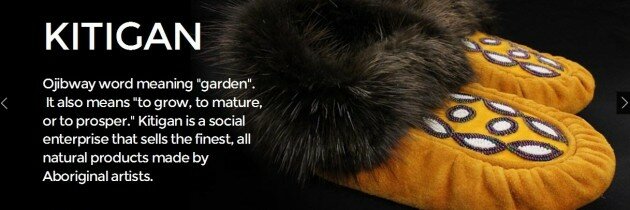Kitigan: A Social Enterprise for Accessible, Authentic, Aboriginal Art
By Stephanie Massot, Canadian CED Network
Note: This article originally appeared on the Canadian CED Network website. SEWF 2013 is proud to include the Canadian CED Network among its organizing partners. Those interested in this article may also want to check out:
- Dr. Wanda Wuttunee’s upcoming presentation, “Living Rhythms: What Social Enterprise Can Learn From Aboriginal Culture” which is part of our main stage plenary called “A Matter of Learning, Leading, Serving: Key Mindsets”,
- The Right Honourable Paul Martin’s keynote, “Indigenous Social Enterprise – A Canadian Experience”
- our Indigenous Social Enterprise program stream (3 sessions with 9 speakers),
- "Scaling Social Impact: Reducing the Friction between Financial and Social Impact Goals", and
- "Marketing Your Social Enterprise - the Fundamentals and the New Essentials".
 What do shoes and authentic Aboriginal art have in common? Nothing, or so I thought as I was hunting along Queen Street in Toronto looking for a new pair of comfortable shoes. Definitely not my favorite activity, but I couldn’t help noticing the moccasins and mukluks on sale. I was tempted. Buying a pair would be a neat way to show my support for Canadian Aboriginals. Then I realized they were knock-offs made in places like Bali and China, and I changed my mind.
What do shoes and authentic Aboriginal art have in common? Nothing, or so I thought as I was hunting along Queen Street in Toronto looking for a new pair of comfortable shoes. Definitely not my favorite activity, but I couldn’t help noticing the moccasins and mukluks on sale. I was tempted. Buying a pair would be a neat way to show my support for Canadian Aboriginals. Then I realized they were knock-offs made in places like Bali and China, and I changed my mind.
 As luck and my job as research and development coordinator for social enterprises at the Canadian Community Economic Development Network would have it, a week later I found myself interviewing the developers of Kitigan, an Aboriginal social enterprise. This one-of-a-kind Aboriginal art business just opened last month and sells authentic, high quality, handmade goods online. Founded by the Ontario Federation of Indian Friendship Centre (OFIFC), Kitigan operates through their ‘social enterprise incubator’ which will enable other Aboriginal social enterprises to develop.
As luck and my job as research and development coordinator for social enterprises at the Canadian Community Economic Development Network would have it, a week later I found myself interviewing the developers of Kitigan, an Aboriginal social enterprise. This one-of-a-kind Aboriginal art business just opened last month and sells authentic, high quality, handmade goods online. Founded by the Ontario Federation of Indian Friendship Centre (OFIFC), Kitigan operates through their ‘social enterprise incubator’ which will enable other Aboriginal social enterprises to develop.
I quickly learned that getting access to the mainstream market is a huge issue for artists such as Georgina Franki, a member of the Tlicho Nation in Behchoko, Northwest Territories. Georgina sells intricately beaded purses made of moose hide.
Georgina sells intricately beaded purses made of moose hide. She learned about Kitigan when she brought some of her work to the OFIFC to sell. This online store is a dream come true for her.
For many Aboriginal artists, especially those who live far from cities, travelling to galleries and organizations to sell their work takes away precious time from creating their art. In addition, their work may be under-valued by buyers. As well, as I witnessed while looking for shoes, their original art forms are often replicated by foreign businesses. Kitigan ensures that the artists are being represented properly to customers through accurate descriptions of their art and that they are not being exploited by paying full value for their work.
Chester Langille from OFIFC explained that providing quality products to customers is their number one priority. Nonetheless their social mission is something they are proud of. In addition to providing Aboriginal artisans with an avenue to promote their work and receive revenue through sales and royalties, Kitigan also builds the capacity of Friendship Centres and participating Aboriginal businesses and organizations, who act as their suppliers.
Kitigan purchases art from their suppliers because they are directly engaged with artists who can be inaccessible to buyers such as Kitigan. In return the suppliers receive commissions on all products sold by Kitigan. Eventually Chester envisions supporting suppliers to have physical distribution outlets which will further build the social economy in their community. I couldn’t believe how streamlined Kitigan was making the process of purchasing authentic Aboriginal art, yet I was still concerned that unsuspecting customers such as myself, may buy an imitation.
 All artists selling their products on the website will be certified through Authentically Aboriginal, when it is launched by Kitigan’s partner Nation Imagination. This quickly addressed my worry. This certification is similar to the Fairtrade Certification for customers that want to be sure that they are supporting fair trade products. The brand Authentically Aboriginal enables Aboriginal artists to differentiate their art from those who simply create "native art" through a certificate and serial number associated with their work. It will be the only registry of its type in Canada.
All artists selling their products on the website will be certified through Authentically Aboriginal, when it is launched by Kitigan’s partner Nation Imagination. This quickly addressed my worry. This certification is similar to the Fairtrade Certification for customers that want to be sure that they are supporting fair trade products. The brand Authentically Aboriginal enables Aboriginal artists to differentiate their art from those who simply create "native art" through a certificate and serial number associated with their work. It will be the only registry of its type in Canada.
Around 80% Kitigan’s anticipated market consists of non-Aboriginal customers. To find Kitigan’s website, the non-Aboriginal community would typically use labels such as “Native American”, “American Indian”, or “Indian” to search for Aboriginal products online. Nevertheless, it was a conscious decision made at the outset of Kitigan to not list their products using these labels.
Considering that Kitigan is faced with the challenge of attracting business from a customer group that is less aware of Aboriginal artwork and artisans, this decision may appear illogical. However, similar to other social enterprises, Kitigan faces the challenge of serving its social goals and making money. In this case, one of Kitigan’s priorities is its cultural mission and by not listing their products using the above labels, they are honouring the teachings and properly representing the identity of Aboriginal people in Canada.
 Kitigan is confident that through search engine optimization techniques, and creative solutions, including partnerships with organizations such as the Ontario Nonprofit Network who can increase the number of backlinks to their website, they will be seeing plenty of traffic and revenue generation.
Kitigan is confident that through search engine optimization techniques, and creative solutions, including partnerships with organizations such as the Ontario Nonprofit Network who can increase the number of backlinks to their website, they will be seeing plenty of traffic and revenue generation.
I encourage you to check out Kitigan and other Aboriginal social enterprises such as those mentioned in Trico Charitable Foundation’s blog. The Osoyoos First Nation’s Nk’mip Cellars is a beautiful winery! As for myself, I am leaving behind the crowded streets and packed stores and jumping onto Kitigan to buy a pair of moccasins that supports authentic Aboriginal arts.
More about the Canadian Community Economic Development Network and Stephanie Massot
 The Canadian Community Economic Development Network (CCEDNet) is a national member-led organization committed to strengthening Canadian communities by creating economic opportunities that enhance social and environmental conditions.
The Canadian Community Economic Development Network (CCEDNet) is a national member-led organization committed to strengthening Canadian communities by creating economic opportunities that enhance social and environmental conditions.
Stephanie Massot is a Social Enterprise Research and Development Co-ordinator and a CreateAction participant in the Toronto office of the Canadian CED Network. You can reach her at ontario at ccednet-rcdec.ca or on LinkedIn.






